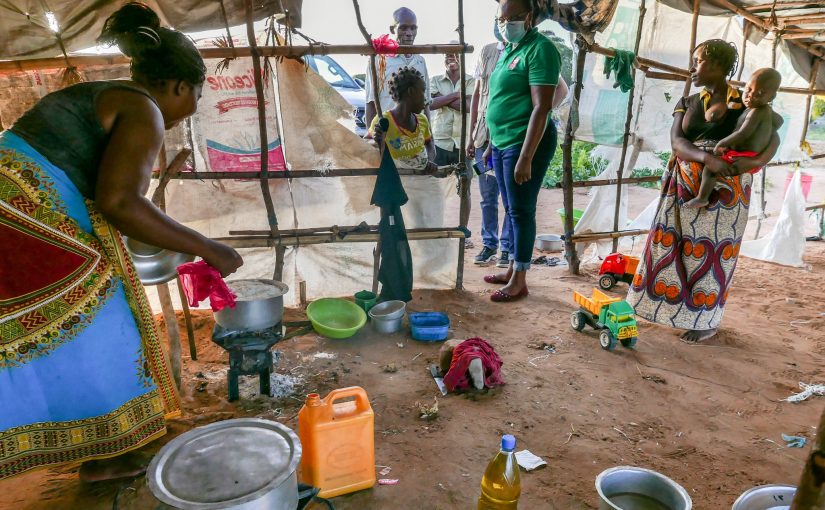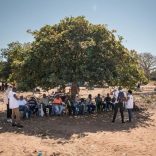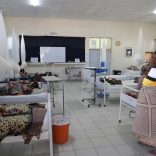Mozambique: President of the Republic encourages expansion of World Vision's actions
Cabo Delgado: Only 10% of displaced families have adequate diet

File photo: Lusa
Only one in 10 families displaced by violence in Mozambique’s Cabo Delgado province has an adequate diet, according to a study by non-governmental organisations active in the region. The NGOs warn of the effect that conflict, drought and pandemic have had on food availability there.
Conducted by the non-governmental organisation Aid in Action, which has been working in Cabo Delgado province since 2016, and the Institute for Studies on Conflict and Humanitarian Action (IECAH), the report analyses food insecurity in the province, which since 2017 has been terrorised by attacks by armed rebels, with some attacks claimed by a local affiliate of the ‘Islamic State’ extremist group.
The conflict has led to more than 3,100 deaths, according to the ACLED conflict registration project, and displaced more than 817,000 people, or over one third of the province’s population, according to national authorities.
This, combined with extreme weather phenomena and the Covid-19 pandemic, “has alarmingly reduced the availability of food in Cabo Delgado” over the last year and triggered a “terrible humanitarian situation”, according to the report released on Wednesday.
In an interview with Lusa, the director of Aid in Action in Mozambique, Jesus Marty, said that the study confirms what aid workers are seeing on the ground and reinforces the idea that “conflicts like these, especially in communities that already have food vulnerabilities”, have a major impact on food security.
Based on surveys of 1,045 families and over 5,000 vulnerable people, the study employs a methodology used by the World Food Programme (WFP) to assess food security in emergencies, which classifies the security status of each family as “poor”, “borderline” or “acceptable”, according to how often each type of food is consumed.
According to the findings, overall 60% of households surveyed in Cabo Delgado are experiencing a “poor” and 27 per cent a “borderline” food security situation, with only 14% having an “acceptable” food security status.
The situation is worse among displaced people, who are effectively deprived of a means of making a living in host areas. In this group, 90% of households have unacceptable food security (either poor or at risk) compared to 72% of local households.
The percentage of households with poor food security among displaced households – 66% – is almost double that of local households, the study finds.
Moreover, among displaced households, those in resettlement centres (4% of the total) show poor nutrition in 27% of cases, compared to 61% in those in shelters or other places.
Some 81% of displaced persons are housed in the dwellings of family or friends.
A third of the families surveyed were housed in accommodation shared by several family groups, some with more than 10 people, and a maximum of up to 26 people, living together.
According to the report, this large influx of displaced persons puts enormous pressure on the already scarce resources of host families, particularly in terms of food.
“If in a house with very limited resources and you go from seven inhabitants to fourteen or twenty,” Marty illustrates, “if in families that already had problems accessing food and water, whose agricultural production is minimal, only enough for self-sufficiency, or in some cases not even that, if you multiply [the numbers] by two, the effect is… it’s complicated.”
The study also concludes that, in families who have been displaced longer, food insecurity is worse than in those who arrived less time ago, indicating that the situation of internally displaced persons has deteriorated with the passage of time.
According to the report, food shortages are the biggest concern for almost all the households surveyed, both local and displaced, followed by lack of resources for agricultural production, access to decent housing and drinking water.
The authors of the study stress that the findings “reveal the magnitude of the food crisis and highlight the chronic fragility of food systems and livelihoods in host communities.”
Speaking to Lusa, IECAH researcher Beatriz Abellan said that the report shows that “there is a food emergency situation in Cabo Delgado”, and calls on donor countries and humanitarian agencies to step up aid and respond to the call by the United Nations for funding for lasting assistance.
“We think that one should not take a short-term view and just give a food kit, but rather think long term, strengthen the agricultural system, improve cultivation, make plans that are resilient to climate vulnerability … because the situation has worsened, but will worsen even more,” she said.













Leave a Reply
Be the First to Comment!
You must be logged in to post a comment.
You must be logged in to post a comment.